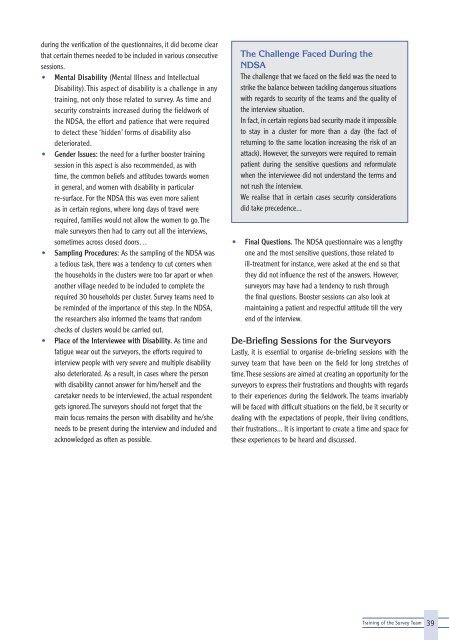Conducting Surveys on Disability: A Comprehensive Toolkit
Conducting Surveys on Disability: A Comprehensive Toolkit
Conducting Surveys on Disability: A Comprehensive Toolkit
You also want an ePaper? Increase the reach of your titles
YUMPU automatically turns print PDFs into web optimized ePapers that Google loves.
during the verificati<strong>on</strong> of the questi<strong>on</strong>naires, it did become clear<br />
that certain themes needed to be included in various c<strong>on</strong>secutive<br />
sessi<strong>on</strong>s.<br />
• Mental <strong>Disability</strong> (Mental Illness and Intellectual<br />
<strong>Disability</strong>). This aspect of disability is a challenge in any<br />
training, not <strong>on</strong>ly those related to survey. As time and<br />
security c<strong>on</strong>straints increased during the fieldwork of<br />
the NDSA, the effort and patience that were required<br />
to detect these ‘hidden’ forms of disability also<br />
deteriorated.<br />
• Gender Issues: the need for a further booster training<br />
sessi<strong>on</strong> in this aspect is also recommended, as with<br />
time, the comm<strong>on</strong> beliefs and attitudes towards women<br />
in general, and women with disability in particular<br />
re-surface. For the NDSA this was even more salient<br />
as in certain regi<strong>on</strong>s, where l<strong>on</strong>g days of travel were<br />
required, families would not allow the women to go. The<br />
male surveyors then had to carry out all the interviews,<br />
sometimes across closed doors…<br />
• Sampling Procedures: As the sampling of the NDSA was<br />
a tedious task, there was a tendency to cut corners when<br />
the households in the clusters were too far apart or when<br />
another village needed to be included to complete the<br />
required 30 households per cluster. Survey teams need to<br />
be reminded of the importance of this step. In the NDSA,<br />
the researchers also informed the teams that random<br />
checks of clusters would be carried out.<br />
• Place of the Interviewee with <strong>Disability</strong>. As time and<br />
fatigue wear out the surveyors, the efforts required to<br />
interview people with very severe and multiple disability<br />
also deteriorated. As a result, in cases where the pers<strong>on</strong><br />
with disability cannot answer for him/herself and the<br />
caretaker needs to be interviewed, the actual resp<strong>on</strong>dent<br />
gets ignored. The surveyors should not forget that the<br />
main focus remains the pers<strong>on</strong> with disability and he/she<br />
needs to be present during the interview and included and<br />
acknowledged as often as possible.<br />
The Challenge Faced During the<br />
NDSA<br />
The challenge that we faced <strong>on</strong> the field was the need to<br />
strike the balance between tackling dangerous situati<strong>on</strong>s<br />
with regards to security of the teams and the quality of<br />
the interview situati<strong>on</strong>.<br />
In fact, in certain regi<strong>on</strong>s bad security made it impossible<br />
to stay in a cluster for more than a day (the fact of<br />
returning to the same locati<strong>on</strong> increasing the risk of an<br />
attack). However, the surveyors were required to remain<br />
patient during the sensitive questi<strong>on</strong>s and reformulate<br />
when the interviewee did not understand the terms and<br />
not rush the interview.<br />
We realise that in certain cases security c<strong>on</strong>siderati<strong>on</strong>s<br />
did take precedence...<br />
• Final Questi<strong>on</strong>s. The NDSA questi<strong>on</strong>naire was a lengthy<br />
<strong>on</strong>e and the most sensitive questi<strong>on</strong>s, those related to<br />
ill-treatment for instance, were asked at the end so that<br />
they did not influence the rest of the answers. However,<br />
surveyors may have had a tendency to rush through<br />
the final questi<strong>on</strong>s. Booster sessi<strong>on</strong>s can also look at<br />
maintaining a patient and respectful attitude till the very<br />
end of the interview.<br />
De-Briefing Sessi<strong>on</strong>s for the Surveyors<br />
Lastly, it is essential to organise de-briefing sessi<strong>on</strong>s with the<br />
survey team that have been <strong>on</strong> the field for l<strong>on</strong>g stretches of<br />
time. These sessi<strong>on</strong>s are aimed at creating an opportunity for the<br />
surveyors to express their frustrati<strong>on</strong>s and thoughts with regards<br />
to their experiences during the fieldwork. The teams invariably<br />
will be faced with difficult situati<strong>on</strong>s <strong>on</strong> the field, be it security or<br />
dealing with the expectati<strong>on</strong>s of people, their living c<strong>on</strong>diti<strong>on</strong>s,<br />
their frustrati<strong>on</strong>s... It is important to create a time and space for<br />
these experiences to be heard and discussed.<br />
Training of the Survey Team<br />
39

















